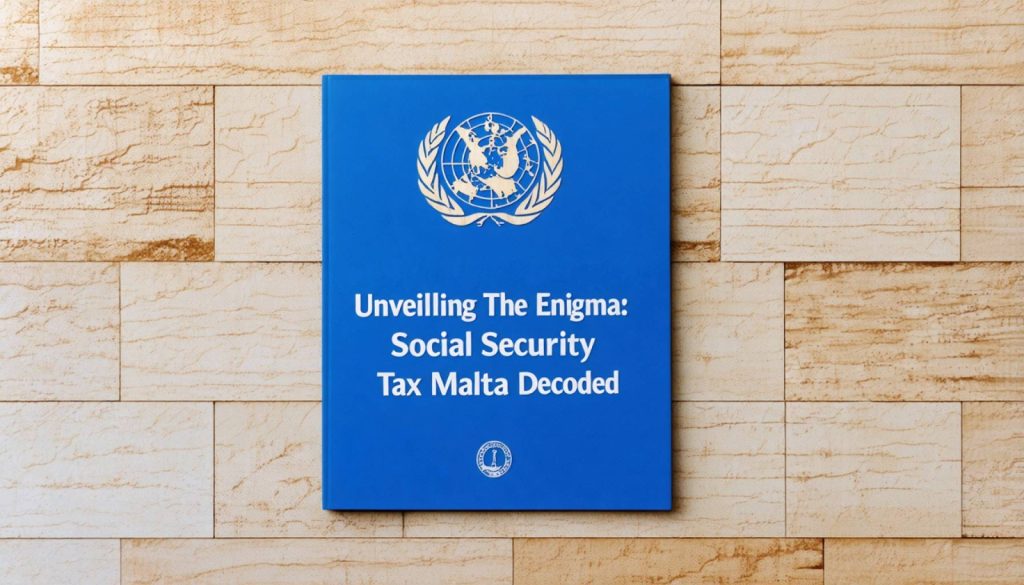
- The Social Security Tax in Malta significantly contributes to the island’s social fabric by funding pensions, healthcare, and sickness benefits.
- Employees and employers both contribute to the system, with a 10% deduction from employees’ wages matched by their employers.
- Self-employed individuals like entrepreneurs also participate, ensuring equitable contributions across the board.
- The system aims to foster solidarity by supporting universal needs, from retirees to new parents, regardless of occupation.
- A continuous debate surrounds the system’s sustainability and efficiency, as policymakers look to balance fiscal responsibility with welfare commitments.
- This tax system represents Malta’s commitment to caring for its citizens, embodying shared responsibility and mutual support.
A gentle Mediterranean breeze caresses the sunlit streets of Valletta, Malta’s bustling capital. Amidst its charming alleys and azure harbors, a less visible entity hums steadily along, impacting the lives of every resident—Social Security Tax. This unassuming fiscal mechanism plays a pivotal role in weaving the social fabric of the island, yet remains wrapped in layers of complexity.
As individuals stroll past the baroque architecture, many may not contemplate the system underpinning their future security. In Malta, Social Security Contributions are a crucial lifeline, not only funding pensions but fortifying healthcare, sickness benefits, and more. The tax captures a slice of every paycheck, aligning itself with the employee’s earnings.

The Process: A Closer Look
Workers in Malta find their income subject to a systematic deduction. Employees aged between 16 and the state pension age contribute 10% of their basic weekly wage, up to a certain cap. Employers match this contribution, stepping into the role of financial guardians for their workforce. The harmonized deductions extend to self-employed individuals, ensuring that each citizen partakes equitably in this social contract.
Imagine Lucy, a young entrepreneur sipping espresso at a quaint café in Sliema. As wavelike clouds drift across the sapphire sky, she contemplates her burgeoning online business. Lucy’s financial commitment to Social Security as a self-employed contributor mirrors that of her employed counterparts, demonstrating a shared investment in Malta’s communal prosperity.
Beyond Numbers: A Human Story
Beneath the spreadsheet figures and tax forms lies a narrative of solidarity. It is a system designed with empathy, addressing universal needs. Whether aiding a retired librarian relishing a peaceful seaside book or supporting a new mother joyously cradling her infant, Social Security Tax weaves a safety net safeguarding the rights and well-being of every Maltese resident.
Improvements and Challenges
No tax system is without its challenges or avenues for improvement. Debate ensues concerning the sustainability and efficiency of the system, especially as Malta’s demographic landscape shifts. Policymakers clutch their legislative pens, poised to adapt to an ever-changing society. The rigorous task is to balance fiscal responsibility with the welfare commitments promised to every citizen.
The Takeaway
Navigating the complex world of Social Security Tax in Malta is akin to an intricately choreographed dance. It demands understanding, adaptation, and above all, solidarity. The system stands as a testament to a nation’s promise to care for each of its citizens, a pledge woven tightly with threads of mutual support and shared responsibility.
The next time you wander Maltese shores or appreciate its historic vistas, take a moment to reflect on the stealth operation sustaining this sun-kissed land. Appreciate how a simple tax, often overshadowed by grander narratives, silently fortifies a nation’s enduring legacy. This social security framework, though intricate, ultimately strives to nurture the island’s most valuable asset—its people.
Unlocking the Mysteries of Malta’s Social Security: Everything You Need to Know
Delving Deeper into Malta’s Social Security System
The sun-dappled streets of Valletta might not immediately bring to mind the importance of social security, yet this financial architecture is essential for Malta’s welfare. To truly appreciate its significance, let’s unpack the system and explore the driving factors, impacts, and future trends associated with Malta’s Social Security Tax.
How Social Security Works in Malta
The Social Security system in Malta is a contributory scheme financed by direct taxes on wages. Both employees and employers contribute an equal share:
1. Employee Contributions: Workers aged 16 until the retirement age contribute 10% of their gross income. This percentage is capped, ensuring that contributions don’t become burdensome for high earners.
2. Employer Contributions: Employers also contribute 10% of each employee’s salary, matching the employees’ contributions.
3. Self-Employed Contributions: Self-employed individuals, like Lucy, contribute a fixed percentage of their net income, which resembles the dual contribution model of the employee-employer system.
This system collectively funds a variety of social benefits, ensuring that even entrepreneurs and freelancers are blanket-covered.
The Real Impact of Social Security Contributions
Beyond the direct financial support, social security contributions deliver profound societal and personal benefits:
– Pension Stability: One of the primary uses of social security funds is to provide an income to individuals during retirement. This ensures stability and economic independence for retirees who have spent decades contributing to the system.
– Healthcare Funding: Social security contributions help sustain Malta’s healthcare infrastructure, delivering universal access to medical services.
– Support for Vulnerable Populations: Funds support sickness benefits, unemployment benefits, maternity leave, and other social services, thereby cushioning the economic impact of life’s uncertainties.
Current Trends and Future Prospects
Malta faces demographic shifts that test the system’s sustainability:
1. Aging Population: With a growing number of retirees, the system needs to sustain a greater number of beneficiaries relative to contributors.
2. Economic Diversification: The rise of gig and digital economies presents challenges in regulating and integrating non-traditional workers into the social security framework.
3. Reform Discussions: Policymakers are discussing reforms to modernize the system while contemplating longevity measures for future generations.
Comparison with Other European Systems
Malta’s system draws similarities to other European models, with countries such as Germany also adopting comprehensive employer-employee contribution schemes. However, Malta’s unique demographic and economic environment necessitates tailored strategies that may differ from even its closest continental neighbors.
Actionable Insights and Recommendations
To maximize the benefits of Malta’s Social Security system:
– Engage in Financial Planning: Residents should periodically review their contributions and projected benefits to ensure adequate retirement planning.
– Stay Informed: With ongoing reforms likely, it’s crucial for residents to understand changes and how they may affect entitlements.
– Advocate for Inclusive Policies: Engaging in civic discussions about social security reforms ensures the system remains equitable and resilient.
By adopting these strategies, Maltese residents can enhance their financial security and contribute to a robust social framework that supports communal well-being.
For more information about Malta’s economic policies and developments, you might find additional resources at the official Government of Malta website.



